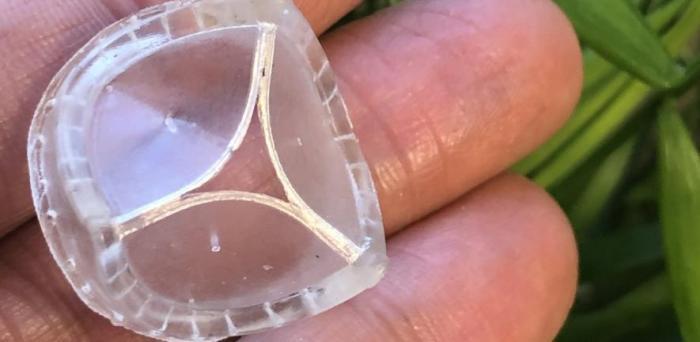The valve, called PoliValve, has been developed by scientists at the Universities of Cambridge and Bristol. The team’s latest in vitro results, published in the journal Biomaterials Science, suggest that the PoliValve can last for up to 25 years in patients, far longer than other types of replacement heart valves. In addition, a small pilot study in sheep showed that the valve is highly compatible with biological tissue. The researchers anticipate that the PoliValve can be tested in humans within five years.
More than 1.3 million patients with diseased heart valves need valve replacement globally each year. There are two types of artificial valves currently available, however both have limitations either in durability or in biocompatibility.
Biological valves are made from pig or cow tissue and have good biocompatibility, meaning patients do not need lifelong blood-thinning medication; however, they only last 10-12 years before failing. And mechanical valves, while they have good durability, have poor biocompatibility and patients must take daily blood-thinning drugs to prevent blood clots.
Professor Geoff Moggridge from the University of Cambridge and Professor Raimondo Ascione from the University of Bristol have spent three years conducting developmental work and testing on the PoliValve, supported by funding from the British Heart Foundation.
The device is made from a special co-polymer and is designed to resemble a natural heart valve. It was created by Professor Moggridge, Dr Marta Serrani and Dr Joanna Stasiak at Cambridge and Professor Ascione in Bristol, and builds on earlier work by Professor Maria Laura Costantino’s group at the University of Milan.
The PoliValve combines excellent durability with biocompatibility, addressing the limitations of current biological and mechanical artificial valves. It is made through a simple moulding process, which also sharply reduces manufacturing and quality control costs.
“These impressive results show the PoliValve is a promising alternative for valve replacement surgery,” said Moggridge, who leads the Structural Materials Group at Cambridge’s Department of Chemical Engineering and Biotechnology. “While further testing is needed, we think it could make a major difference to the hundreds of thousands of patients who get valve replacement surgery every year.”
Image: An advanced prototype of the PoliValve
Credit: Professor Raimondo Ascione, University of Bristol
Reproduced courtesy of the University of Cambridge
